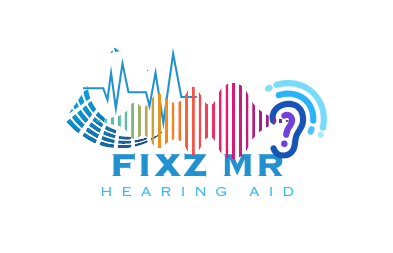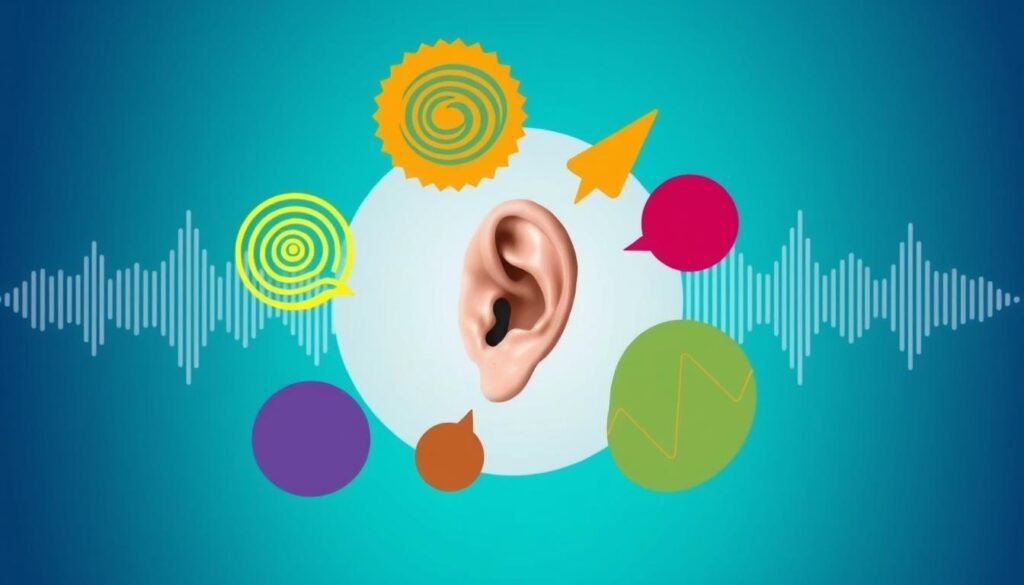Imagine a world where every sound is clear and vibrant for millions who struggle with hearing loss. Hearing therapy is more than just a treatment; it’s a path to restore clarity, boost personal identity, and improve communication. At the heart of this change is the innovative work of groups like Frequency Therapeutics. They’re leading the way in hearing loss treatment with regenerative medicine.
Their groundbreaking method aims to regrow hair cells in the cochlea. This could change everything for people with hearing loss. It moves us from depending on devices to using our body’s healing powers. This could let people hear the world in a whole new way.
Key Takeaways
- Revolutionizing the approach to auditory health through regenerative techniques.
- Clinical trials by Frequency Therapeutics show tangible improvements in speech perception.
- Modern hearing therapy aims for more than augmenting sound—it strives to heal and rehabilitate.
- Therapies under development today will impact social connectivity and enhance quality of life for those with hearing impairments.
- Proactive screening and interdisciplinary cooperation are integral to early hearing loss identification and effective treatment.
- The encouraging research on cochlear hair cell repair manifests a breakthrough in addressing sensorineural hearing loss.
The Impact of Hearing Loss on Daily Life
Hearing loss changes almost every part of daily life. It affects not just health but also social and emotional well-being. It can lead to feeling alone and increase the risk of dementia.
Healthcare providers are now focusing on tinnitus management and reducing social isolation. They help people stay connected and supported through their hearing challenges.
People with hearing loss often find it hard to hear in loud places or talk with others. This affects their personal and work life. The link between hearing loss and cognitive decline and a lower quality of life is clear.
Understanding the Correlation Between Hearing Loss and Dementia
Studies show a strong link between hearing and thinking skills. If hearing loss is not treated, it raises the risk of dementia. Early action by healthcare providers is key to managing these risks.
The Psychological Effects: Social Isolation and Tinnitus
Hearing loss has big emotional effects, causing social isolation and tinnitus. New therapies and devices, like those from Cochlear™, help with tinnitus management. These have made a big difference in people’s lives.
People like Shelly S. found they could connect better and feel more confident with the CochlearTM Baha® System. Tobin F. saw his career improve after getting a CochlearTM Nucleus® implant. These stories show how hearing aids can change lives.
By 2050, 900 million people will be affected by hearing loss. So, effective ear health treatments and devices are crucial.
In summary, hearing loss affects more than just hearing. It impacts mental health, career success, and thinking skills. With the right support and technology, people can improve their lives and social connections.
Revolutionary Hearing Therapy Advancements
The world of hearing healthcare is changing fast, with big steps forward in innovative treatments. Cochlear implant therapy has gotten much better, now part of bigger auditory rehabilitation plans for people with severe hearing loss. New advances, like those from Frequency Therapeutics, bring hope for the future.
It’s important to know how many people are affected by hearing loss. Every year, millions in the U.S. and even more worldwide face hearing problems that change their lives. Innovations like those from Frequency aim to fix hearing loss by making inner ear hair cells, crucial for hearing, grow back.
| Statistic | Details |
|---|---|
| Affected Population | 40 million in the U.S.; global reach in hundreds of millions |
| Clinical Improvements | Frequency Therapeutics dosed 200+ patients, noting improvements in speech perception. |
| Research on Regeneration | Promising hair cell regeneration from early-stage studies, key to restoring natural hearing. |
| Accessibility Impact | FDA approval for over-the-counter hearing aids enhances access to essential devices. |
New innovative treatments are changing the game, making life better for many. Each step forward opens new possibilities, not just in hearing tech but also in overall health through auditory rehabilitation. Frequency’s trials showed big improvements in hearing after treatment, which is a big deal for the future.
In summary, combining cochlear implant therapy, cutting-edge research, and patient focus sets the stage for big changes in hearing therapy. As we move forward, we’re not just fixing hearing; we’re redefining what’s possible in hearing health care.
The Role of Progenitor Cells in Hearing Restoration
Progenitor cells are showing great promise in helping people with hearing loss. They could be a big step forward in regenerative medicine. Researchers are looking into how these cells can help grow new inner ear hair cells. These cells are important for hearing but don’t grow back after birth.
Companies like Frequency Therapeutics are leading the way in this research. They aim to offer new treatments that go beyond traditional hearing aids.
About 15% of American adults have some trouble hearing. Regenerative medicine is working to change that. Clinical trials have shown big improvements in hearing and speech after treatment. This includes working with hearing aid specialists for the best results.
Decoding the Biology of Inner Ear Hair Cells
Researchers have found that progenitor cells can help grow new inner ear hair cells. This is shown through studies on a drug called FX-322 from Frequency Therapeutics. In clinical trials, FX-322 has helped people with hearing loss from noise or sudden hearing loss.
Clinical Breakthroughs in Speech Perception Improvement
Studies by Frequency Therapeutics have shown how their treatment can improve speech. In a Phase 2b study, patients saw big improvements in speech after a few months. This shows how new treatments can help people with hearing loss in a big way.
These treatments can greatly improve a person’s life and how they connect with others. Learn more about coverage options here.
| Study Highlight | Impact on Hearing | Duration Post-Treatment |
|---|---|---|
| Authorization of FX-322 | Improvement in noise-induced hearing loss cases | 90 days to 2 years |
| Phase 2b Completion | Substantial speech perception improvement | Assessments ongoing, anticipated results in Q1 2023 |
| Remyelination Research in MS | Innovative transfer of hearing restoration research | Long-term (Across multiple studies) |
Frequency Therapeutics: Pioneering Regenerative Hearing Therapy
Frequency Therapeutics leads in creating innovative treatments to help people hear better. They aim to change hearing therapy with biological solutions. This could greatly improve communication and life quality for those with hearing loss. But, innovation comes with ups and downs.
Recently, Frequency Therapeutics made big changes in their research. They stopped working on FX-322 and FX-345, which aimed to treat hearing loss. These programs were seen as big hopes for hearing loss treatment, using small molecules to help cochlea cells grow back.
Phase 2b trials showed FX-322 didn’t improve speech perception much over a placebo. This led Frequency Therapeutics to focus on a new area. They’re now exploring a treatment for Multiple Sclerosis (MS) patients.
These changes also mean they’re cutting about 55% of their staff. This is part of a plan to make the company more efficient and last until 2025. It shows how tough biotech research can be and the need for flexible plans to succeed.
| Parameter | Details |
|---|---|
| Initial Focus | Regenerative hearing therapies for SNHL |
| New Focus | Remyelination therapy for MS |
| Impact of Phase 2b Results | No significant improvement in hearing perception observed |
| Financial Status | $83.1 million in assets as of year-end 2022 |
| Restructuring | Approximately 55% reduction in workforce |
Even with challenges, companies like Frequency Therapeutics are key to the future of medicine. Their drive to advance science, even when it’s hard, shows the potential of hearing therapy and healthcare innovation. As we explore new frontiers, we see the complex journey to innovative treatments that could change health and wellness for the better.
The Audiology Clinic Experience: Beyond Just Devices
Looking into audiology services shows a big change. It’s moving from just selling devices to focusing more on the patient. At the core, audiology now aims for personalized audiological care. This change shows how audiology clinics do more than just sell devices.
Today, working with hearing healthcare providers means getting a full range of tests and treatments. These are tailored to fit your life and hearing needs. Advanced treatments once found only in big hospitals are now offered by these experts. This makes hearing care more accessible to everyone.
Comprehensive Assessments by Qualified Audiologists
Qualified audiologists use the latest tech to deeply understand your hearing. They adjust hearing aids just for you. This move from just fixing devices to really listening to patients builds trust and helps with long-term hearing care.
Tailoring Therapy to Individual Hearing Profiles and Lifestyles
Audiologists use their deep knowledge to create personalized audiological care plans. They use your feedback to set up hearing aids. This makes hearing better and makes wearing aids more comfortable, no matter your life or work.
| Year | Percentage of Adults Aged 70+ Tested | Caucasians | African Americans | Mexican Americans |
|---|---|---|---|---|
| 2016 | 39.5% | 39.1% | 43.3% | 41.5% |
The table shows how hearing tests reach different groups of people. It highlights the focus on older adults. The numbers show progress but also areas where we need to do better. This underlines the importance of ongoing efforts in audiology.
Today, hearing healthcare providers blend technology with care. They’re key to trust and innovation, changing how patients experience care. By offering detailed tests and custom solutions, audiologists greatly improve life for many people.
Hearing Therapy Options: Exploring the Spectrum
Advances in hearing therapy have brought many options to the table. These options meet different needs and budgets. From OTC hearing aids to cochlear implants, people with hearing loss can find ways to improve their hearing.
Hearing aid specialists are key in helping patients choose the right option. They know how to assess hearing loss and recommend the best devices. They help with everything from OTC hearing aids to cochlear implants, making sure each patient gets the right help.
PSAPs (Personal Sound Amplification Products) are a budget-friendly choice for those needing help in certain situations. They’re perfect for people who aren’t ready for full-time hearing aids yet.
Looking into these options? Check out this study on sound-based treatments and their results. It can help users and experts make better choices with the latest science.
| Type of Device | Cost | User Feedback | Accessibility |
|---|---|---|---|
| OTC Hearing Aids | More affordable | Positive for mild to moderate loss | High (available in retail stores) |
| Cochlear Implants | Higher investment | Highly positive for severe loss | Specialist fitting required |
| PSAPs | Least expensive | Mixed, situational use | Very high (online and in-store) |
Choosing between cochlear implants and OTC hearing aids or PSAPs depends on what you need. Each option helps improve communication and quality of life. They show the importance of tailored care and technology in overcoming hearing loss.
From Cochlear Implants to Hearing Aids: A Range of Solutions
The world of hearing loss treatment has grown a lot, thanks to new technology. Now, people with hearing loss can find affordable hearing loss treatment that makes life better. This is thanks to a variety of devices available today.
Understanding the Advancements in Cochlear Implant Therapy
Cochlear implants have come a long way since the 1980s. They are now advanced systems that help people with severe hearing loss. Research keeps improving these implants, making sound more natural and comfortable for users.
Today, over 736,900 cochlear implants have been used worldwide. They help both kids and adults. Even children as young as nine months can get them, giving them a head start in learning language.
Assessing Affordable Solutions: OTC Hearing Aids and PSAPs
There are also OTC hearing aids and PSAPs for those with mild to moderate hearing loss. These devices use digital tech, letting users adjust settings with apps and improve sound quality. The latest in-ear hearing aids show how technology has made hearing aids smaller and better.
| OTC/PSAP | Features | Affordability | User Rating |
|---|---|---|---|
| NewHearBasic | Adjustable settings, Noise reduction | High | 4.0/5 |
| EcoSound Amplifier | Feedback suppression, Long battery life | Medium | 3.8/5 |
| ClearSounds Plus | Bluetooth streaming, Tinnitus masking | Medium | 4.5/5 |
These new hearing solutions show how technology has opened up more ways for auditory rehabilitation. People can now choose the best and affordable hearing loss treatment for their needs.
Addressing Tinnitus: Strategies for Management
For many, tinnitus makes life hard with its constant ringing or buzzing in the ears. Tinnitus management with help from hearing healthcare providers uses many strategies to lessen these symptoms.
Key to managing tinnitus is hearing therapy and devices that change how we hear sounds. Techniques like hearing aids and special sound therapy devices help a lot. Advanced methods like Tinnitus Retraining Therapy (TRT) and cognitive behavioral therapy work well too. They help the brain get used to the tinnitus sounds, making them less annoying.
When dealing with hearing healthcare providers, it starts with checking and managing the tinnitus. They look at the history and do exams to find the best treatments. They focus on how long the tinnitus lasts, where it is, and how it affects life.
- Various sound therapy treatments.
- Behavioral and cognitive therapies.
- Educational counseling to empower effective self-management.
Changing your lifestyle is also key in managing tinnitus. You’ll get advice on diet, stress, and avoiding loud noises. These changes help lessen tinnitus symptoms.
For severe tinnitus, treatments like cochlear implants or advanced hearing aids might be needed. For more info, check out comprehensive guides on tinnitus management. They show how treatment has improved and is now more accessible.
| Management Strategy | Typical Use | Effectiveness |
|---|---|---|
| Sound Therapies | Masking tinnitus sounds | Highly effective for mild to moderate tinnitus |
| Cognitive Behavioral Therapy | Altering perception and reaction to tinnitus | Effective in reducing tinnitus-related distress |
| Hearing Aids | Compensating for hearing loss associated with tinnitus | Beneficial especially when combined with sound therapy |
In conclusion, tinnitus management needs a full approach from skilled hearing healthcare providers. It combines therapy, lifestyle changes, and sometimes, advanced devices. Together, these help people live with less tinnitus trouble.
The Future of Hearing Therapy
The future of hearing therapy is growing fast, bringing new changes to how we treat hearing loss. We’re seeing big steps forward in regenerative medicine, hearing loss treatment, and speech therapy. These changes could greatly improve the lives of millions with hearing problems.
Potential of Stem Cell and Gene Therapies in Audiology
Breakthroughs in regenerative medicine are bringing hope to hearing therapy. Researchers are looking at stem cells and gene therapies to help hearing. For example, some kids with severe hearing loss got better after gene therapy.
There are over 150 genes linked to hearing loss, offering many new treatment options. This could change audiology for the better.
New Drug Developments and Personalized Treatment Plans
New drugs are being made to help with hearing loss. For example, Sodium thiosulfate might protect against hearing loss from certain drugs. This is a new way to help people hear better.
Personalized medicine is also changing how we treat hearing loss. By using genetic tests and custom therapy plans, we can help people hear better. This makes hearing loss treatments and speech therapy more effective.
Looking ahead, we see big changes in gene therapy, pharmacology, and personalized medicine. These changes are leading to better and more lasting solutions for hearing loss. With technology, science, and care for each patient, we’re entering a new era in treating hearing loss. This brings hope and better lives to those with hearing issues.
Conclusion
Today, we have more ways to help with hearing loss than ever before. Groups like the American Academy of Audiology and the National Institute on Deafness and Other Communication Disorders have shown how important it is to treat hearing loss. They found that cutting-edge hearing therapy, including hearing aids and cochlear implants, can really improve life quality for adults.
Therapies like bone-anchored hearing systems work well for many people, even those with other health issues. By creating treatment plans that fit each person’s needs, we can make a big difference. This approach helps people feel more confident and happy as they connect with others.
Research shows that good hearing care is linked to better mental health. For example, quickly treating sudden hearing loss can help with depression. This shows how important it is to tackle hearing loss well. The future of hearing loss treatment is all about working together for better health. It’s about making sure everyone can hear and connect with others.









